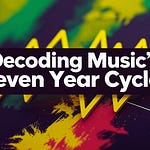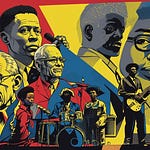Greetings, Reggaeology Family,
The world of music has changed dramatically in recent years. Gone are the days when dropping an album or releasing a single would be the main driver of an artist’s success.
With the rise of streaming platforms and the devaluation of recorded music, today's artists are no longer focusing solely on selling their music—they’re selling an experience.
In this issue, we look into the changing landscape of the music industry and explore how artists, particularly those in reggae and dancehall, can thrive in the new experience-driven economy.
Streaming & The Devaluation of Recorded Music
Let's face it—streaming services have transformed the music industry. What once took months of planning, marketing, and physical distribution can now be accomplished with a few clicks.
While this has made music more accessible to the masses, it's also contributed to its devaluation.
Streaming platforms like Spotify, Apple Music, and YouTube have become the dominant ways fans access music, but they offer meager payouts per stream.
According to recent reports, it can take over a million streams just to earn a few thousand dollars.
For many artists, particularly independent ones, this means the days of relying on album or single sales for significant income are over.
In reggae, where albums used to be cultural events—think Bob Marley’s Exodus or Buju Banton’s Til Shiloh—we’re now seeing less emphasis on major album rollouts.
The focus has shifted towards singles, collaborations, and remixes, which are more consumable in the streaming age.
But what does that mean for artists and producers trying to make a living?
The Rise of the Fan Experience Economy
It’s not about selling the song anymore—it’s about selling the experience.
Today’s fans are craving more than just the music; they want a deeper connection with the artists they love.
Think about the feeling of seeing an artist live, meeting them backstage, or owning a piece of exclusive merchandise. Fans want a personal, memorable interaction, something that makes them feel like part of the artist’s journey.
Monetizing the fan relationship is now key. For reggae and dancehall artists, this presents exciting opportunities.
Artists like Chronixx, Protoje, and even legends like Toots and The Maytals, who tapped into their fan base through immersive experiences, merchandise, and exclusive content, have shown that reggae artists can thrive beyond album sales.
How Reggae Artists Can Connect with Fans
In today’s experience-driven world, reggae and dancehall artists are finding innovative ways to connect with their fans, ensuring lasting relationships that go beyond just listening to music.
One effective method is offering exclusive merchandise.
Limited-edition items like vinyl records, download cards, custom clothing, or personalized gear give fans a sense of ownership, making them feel like they are investing in more than just merchandise—they're buying into the artist's legacy.
Another approach is through direct fan engagement on platforms like Patreon and Bandcamp, where artists can connect with their supporters on a more personal level.
These platforms allow fans to support artists directly, often in exchange for exclusive content such as unreleased tracks, live performance videos, or behind-the-scenes insights into the artist’s creative process.
This builds a deeper connection as fans gain access to material they can't find anywhere else.
VIP concert experiences are another effective way reggae artists can enhance their connection with fans.
While live shows have always been a cornerstone of reggae culture, adding extra elements like meet-and-greet packages, backstage passes, or even virtual reality concerts adds a new layer of engagement.
Imagine the excitement of hardcore fans attending a Dubwise session with added VIP perks—these experiences resonate deeply and create lifelong memories.
Virtual events and content have become increasingly popular, especially during the pandemic, and they continue to offer a valuable way for artists to engage with fans globally.
Streaming live performances, hosting intimate Q&A sessions, or sharing special online interactions allow artists to maintain strong connections with their audience, even from a distance.
Finally, some artists are experimenting with cutting-edge technology like blockchain and NFTs.
By offering fans the chance to "own" unique digital content—such as an exclusive song, artwork, or video—through NFTs, artists are providing a new way for fans to support them while giving them access to rare content.
This decentralized approach creates a deeper level of engagement, as fans feel like they’re part of something truly unique in the artist's journey.
By embracing these strategies, reggae and dancehall artists are finding fresh ways to foster strong relationships with their audiences, enhancing their connection while creating new opportunities for both artistic and financial growth.
Live Shows: The Cornerstone of Fan Engagement
In reggae and dancehall, live shows have always been a core aspect of the fan experience.
Whether it’s the pulsating bassline at a sound system clash or the uplifting energy of a roots reggae concert, these experiences create lifelong memories for fans.
Many artists today prioritise live performances as their main revenue source, often accompanied by merchandise sales or VIP experiences.
Take for example Jamaica’s very own Damian Marley or Protoje. These artists are constantly on the road, using live shows not only to promote their music but to engage fans more intimately.
The Welcome to Jamrock Cruise, a multi-day music festival at sea, is another great example of combining live performances with exclusive fan experiences.
The fans that board that cruise aren’t just getting a concert—they’re getting a journey with their favourite artists.
Beyond Music: The Power of Brand Identity
In this new world, artists are brands. The ones who build a strong, authentic identity are the ones who succeed.
Bob Marley wasn’t just about the music; he represented a movement, a way of life.
In today’s market, fans buy into that same level of cultural connection with their favourite artists.
When artists embrace their identity and express it through social media, collaborations, or even ventures outside of music (think fashion, podcasts, or film), they tap into a deeper level of engagement.
Fans feel like they’re part of the artist’s world—not just passive consumers of their music.
In reggae, authenticity matters.
Whether it’s through Rastafarianism, political commentary, or messages of unity, fans are drawn to artists who represent something greater than just the music.
This is where reggae has an edge—the message itself is a movement.
The Future of Reggae is in the Experience
The music industry may have shifted, but reggae artists have a unique opportunity to thrive in this experience-driven economy.
The genre’s rich cultural history, emphasis on live performance, and authentic connections with fans provide a solid foundation for success.
In this new age, it's about creating immersive, meaningful experiences that fans are willing to pay for—whether it’s through live shows, exclusive content, or personal interactions.
As reggae continues to evolve, one thing is clear: the artists who prioritize building deep relationships with their fans will be the ones who will survive the purge.
It’s Laing.. I'm Out.
Reggaeology: Where Music Meets Insight














Share this post